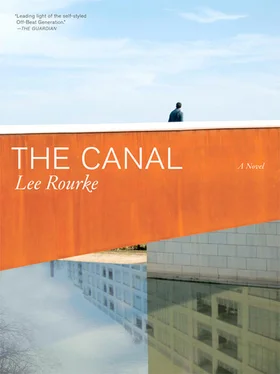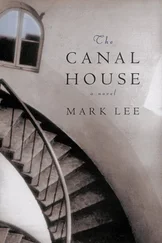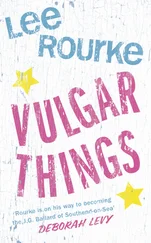I stood by the wall, where the bench used to be. I watched the dredger. It was called The Ducketts . I had no idea what that meant, but I liked the name nonetheless. I wasn’t aware, until that moment, that dredgers had official names, much like a train or a civil aircraft. It had a blue cabin at the far end, with a large lowered deck for the retrieval of debris, its outer rim flat so the operators could walk around it. At the opposite end to the blue cabin was the crane that was used to lift heavier things that had become embedded in the slutch up and out of the water. The dredger was near-filled to capacity, and I remember thinking that it was a real feat of engineering that such an awkward looking piece of machinery could actually float.
I had been waiting for this pathetic moment since I first walked away to my bench, and even though the dredger had finally appeared I still didn’t feel that everything I wanted — the cleaning of the muck and slutch and filth around me — would ever happen. Nothing appeared. All this waiting. Nothing but here. Endless here.
Again, I put my head up to the wall to look down along it, to follow its line, this time with my left eye, towards Hackney. That’s how I saw her appear, walking towards me. She was looking up at the sheer size of the wall, looking up at it as she walked along. Slowly. She seemed in a trance, enveloped in a thick miasma. It was as if she was expecting every minute detail of the new structure, every workman’s nail, every angle and board. I watched her all the way, my head resting on the cold wood, all the way to me — or where the bench, our bench used to be. She traced her fingertips along the smooth surface of the wood. She was still caressing it when she finally stopped beside me.
“It’s all gone then …?”
She uttered these words quietly. I knew instantly what it was she actually meant. Our space had shifted. We felt uncomfortable. Awkward and mawkish. We felt exposed. Revealed. I drew my eyes up to look at her fully, lifting my head back off the wall. I felt embarrassed. I answered her.
“They’ve put it up because of us …”
She ignored me, staring up at the wall; then turning to look over to the whitewashed office block … before eventually turning back to me.
“This is no good.”
“What? Here?”
“Yes. Here . It’s no good anymore.”
“Well, shall we go and get something to eat? I know a café not far from here.”
“Yes. I know you do. Okay then.”
“Pardon?”
“ The café .”
I was quietly surprised by her answer. My legs felt like lead. I tried to say something to her. I tried to say, “I’ve been waiting for this …” But I somehow couldn’t form the correct movements and positions with my mouth, it opened, but simply wouldn’t do anything. Nothing seemed to work. Eventually I managed to mutter, “Yes.”
So we walked along the towpath. Towards Islington. Towards the Café. The Rheidol Rooms. I felt like an automaton walking along with her. I remember gliding along like I was a machine on autopilot. Like it had all been preprogrammed pre-route.
As we walked along the towpath a gaggle of Canada geese joined us, paddling alongside at exactly the same pace, their heads bobbing back and forth in motion. There were seven in total. I counted each one to make sure. Then I noticed that one of them wasn’t a Canada goose at all; it was a smaller, stockier breed, sporting a bright orange bill. She, or he, looked happy, not caring about being different, not bothering about its individuality, happily paddling along. They continued alongside us until we reached Wenlock Basin, where they turned left, away from us, towards a group of people eating sandwiches by a bench below the expensive flats on the other side of the basin.
We walked in silence. I was thinking about the wall, about what they were building on this side of the basin: more expensive flats. People would be marginalised, people would be removed, those who couldn’t afford to stay. It didn’t seem fair. It didn’t seem right. All of a sudden it hit me: it felt odd, slightly disingenuous even, that she would join me for some lunch, something that she had vehemently resisted doing with me so many times before.
The café was empty. We walked inside and took a seat at a small table for two by the window. A bored-looking waitress looked up from her fingernails and walked over to our table. She stood over us, waiting for us to speak. The taint of fried egg and chip fat followed her. I liked her, there was no fuss about her persona; she was plain and simple. She existed and that was enough, there was no need for anything else because everything else was superfluous to her. I raised my eyes. I could see straight up her nostrils.
“I’ll have a black coffee and …”
I turned to my companion. She was looking at the menu, furrowing her eyebrows into a tight V. Then she looked up, smiling.
“I’ll have a hot chocolate and a baked potato with chili, please … May I have lots of butter on the potato?”
The waitress shrugged, as if to imply that ordinarily she wouldn’t give out extra butter to customers. Then she turned to me, but I’d been observing them and wasn’t prepared.
“Are you not eating? I thought you were hungry.”
“I don’t know what to have …”
“Have the same as me …”
“Okay, I’ll have the same again, please …”
“Extra butter for you, too?”
“Er … Yes, please.”
The bored waitress walked away to the kitchen. As I was about to open my mouth to speak, two more people walked into the café. A man and a woman. I didn’t recognise them at first, probably because it was the first time I had seen them up close. But after a moment it hit me — it was them, the couple from the whitewashed office block. The same man and woman who had been smoking out on the company esplanade. The man in the tight shirts and cardigans, the woman who sits at the desk that he walks back and forth to throughout the working day. It was definitely them. They eventually took a table opposite us after looking up at the menu boards above the counter. They sat down after he carefully removed her coat for her, smiling, giddy, happy, sitting close together, huddled.
She wouldn’t look at them. She stared down to her feet. I knew that she knew who they were. She had seen them enter the café and eventually recognised them as I had. A deathly silence descended upon our table. I didn’t know what to do to defeat it. I felt completely powerless. She was hunched over, staring down at our table, at her feet. Something to concentrate on, something to divert her eyes and mind away from the couple from the whitewashed office block sitting directly opposite us, close enough to hear, to smell. I tried to listen to what they were saying but they were purposely talking in whispers, sensing the quiet, aware that they could be heard, lending the situation the feeling that it was some sort of clandestine tryst.
Suddenly the man leant over their table and kissed her. It was a lingering, open-mouthed kiss on her lips, intimate and sensuous. There was no movement in front of me, although I could detect a fierce rage building inside her. She definitely didn’t want the man and woman there, at the table opposite us, and she obviously didn’t want there to be any physical contact between them. She knew who they were, or at least him. It was her sole reason for sitting on the bench each day. Her sole reason: him.
I tried to gain her attention by pointing to a cat out through the window. It was crossing the road from the opposite side where the Duke of Cambridge pub was.
“Look! A cat using a zebra crossing! How clever!”
Читать дальше












